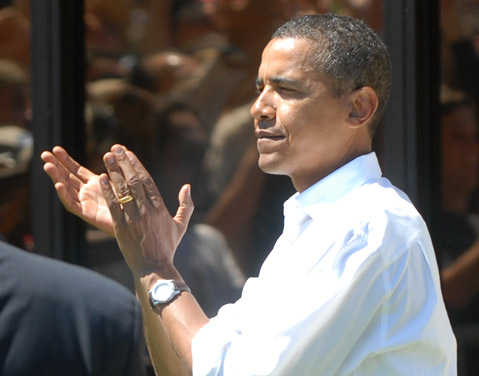Down, But Not Out
One Year Out, Three Keys to the Political Fate of an Underdog President

More people are out of work than at any time in decades. Three of four Americans feel the country is on the wrong track. A majority says the president is a weak leader who’s doing a lousy job.
Barack Obama has the Republicans right where he wants ’em.
One year before voters decide whether to grant him a second term, a nation deeply pessimistic about the future is deeply disappointed in President Obama. The “hope and change” promises of his 2008 landslide have evaporated amid the worst economic conditions since the Great Depression, a conservative populist uprising against government, and the utter failure of his feeble brand of consensus politics.

Facing conventional wisdom that no president can win reelection with unemployment as high as 9 percent, Obama is cast by many pundits as the millennial embodiment of Jimmy Carter and George H.W. Bush, the last two incumbents voted out after one term while being blamed for bad economies. An op-ed writer for the Wall Street Journal summed up the prevailing view:
“There is nothing remotely ideological or personal in my prediction that President Obama will lose the 2012 election,” wrote financial blogger Charles Hugh Smith. “American elections boil down to this: Americans vote their pocketbook, and their pocketbooks will be a lot lighter by November 2012.”
But as those anointed president a year before Election Day — Hillary Clinton, Rudy Giuliani, and Al Gore — can attest, one year is a lifetime in politics, making crystal ball pundits only slightly less reliable than Ouija Board PhDs. Beyond Obama’s overwhelmingly negative polls, three political fundamentals are far more significant in analyzing the presidential race.
YOU CAN’T BEAT SOMEBODY WITH NOBODY: Elections are choices, and until there is a real candidate to whom Obama can be compared, generic measures of voter opinion about him are worthless in forecasting how he will perform a year from now.
The reality TV show that is the race for the Republican nomination includes the most eclectic collection of characters since the bar scene in Star Wars, nearly all of whom stand well to the right of independent voters who hold the electoral balance of power, providing Obama a big opening to portray them as extremists.
Putative front-runner Mitt Romney is the only major GOP wannabe who even tries to aim his views past the right-wing Republican primary electorate and toward the more moderate, mainstream audience that votes in November. But his record of shape-shifting on issues — abortion, health care, and immigration, for starters — makes him vulnerable to character attacks for lacking core convictions.
DEFINING THE ELECTION: Winning candidates are those who succeed in selling voters their narrative of what an election is basically about. Any Republican nominee will frame the race as an up-or-down referendum on Obama’s first term; he will define it as a compare-and-contrast choice between dramatically different visions of the role of government in helping people in a dismal economy.
THE NONNATIONAL ELECTION: The Electoral College system means a presidential race is really 51 separate elections, waged in the states and the District of Columbia. Obama captured 365 electoral votes in 2008, giving him a considerable margin of error for the necessary 270 that time out. Despite his problems, he begins this campaign with a traditionally Democratic base of 247, so the election likely will be decided in nine states — Colorado, Florida, Indiana, Iowa, Nevada, New Mexico, North Carolina, Ohio, and Virginia — that he won (and which went to George W. Bush four years earlier) and in a trio of Democratic industrial states — Michigan, Pennsylvania, and Wisconsin — that the dismal economy may put in play.
The New York Times’ Nate Silver, who covers the vagaries of polls, recently crunched the economic and political variables for four campaign scenarios in the paper’s magazine, concluding with this masterpiece of nuanced equivocation:
“Average these four scenarios together and the probabilities come out to almost exactly 50-50,” Silver wrote in his 5,000-word opus. “It is early, and almost no matter what, the election will be a losable one for Republicans. But Obama’s position is tenuous enough that it might not be a winnable one for him.”
Take it to the bank.



